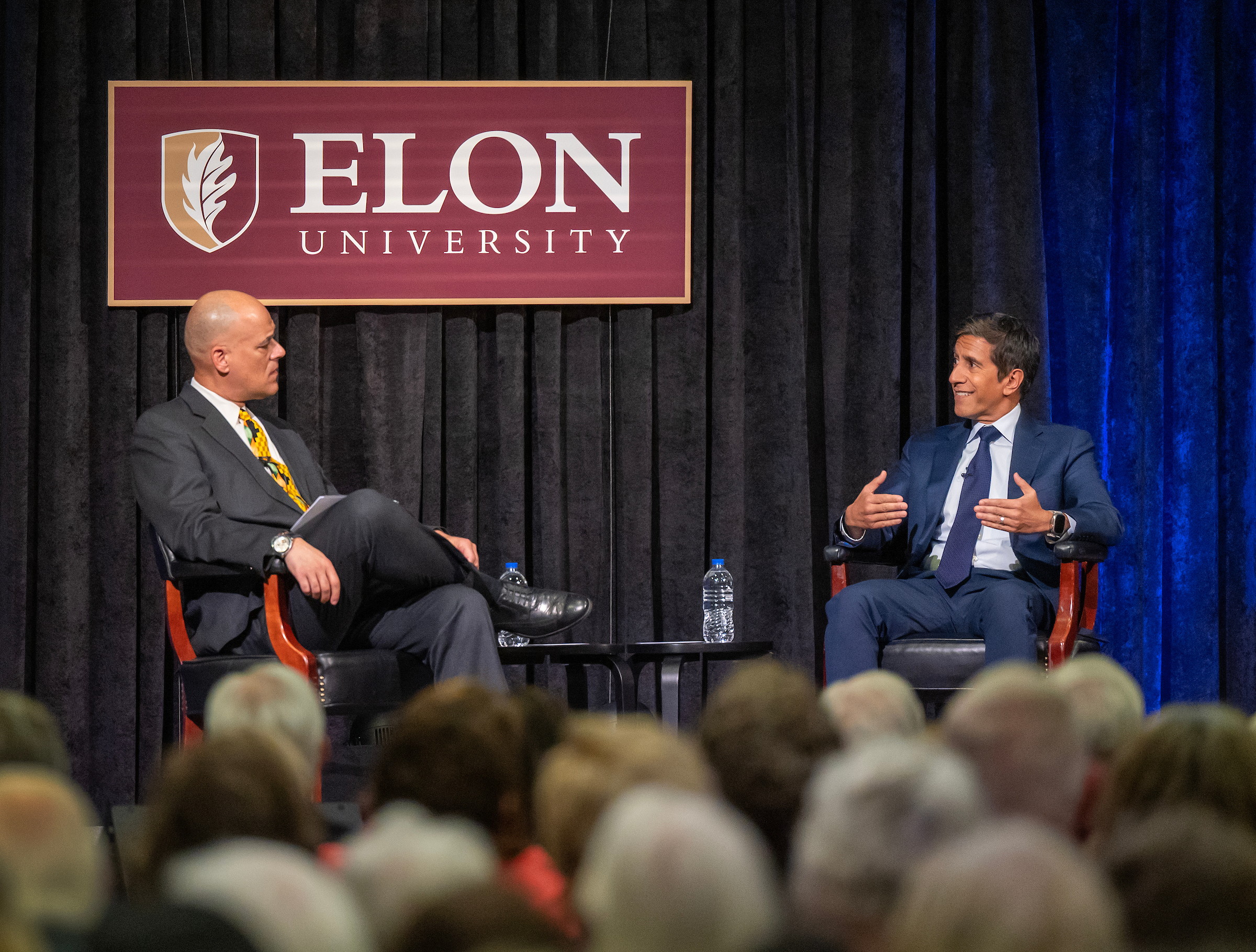Gupta, neurosurgeon and Emmy Award-winning correspondent, delivered the annual Baird Lecture on Tuesday, March 28.
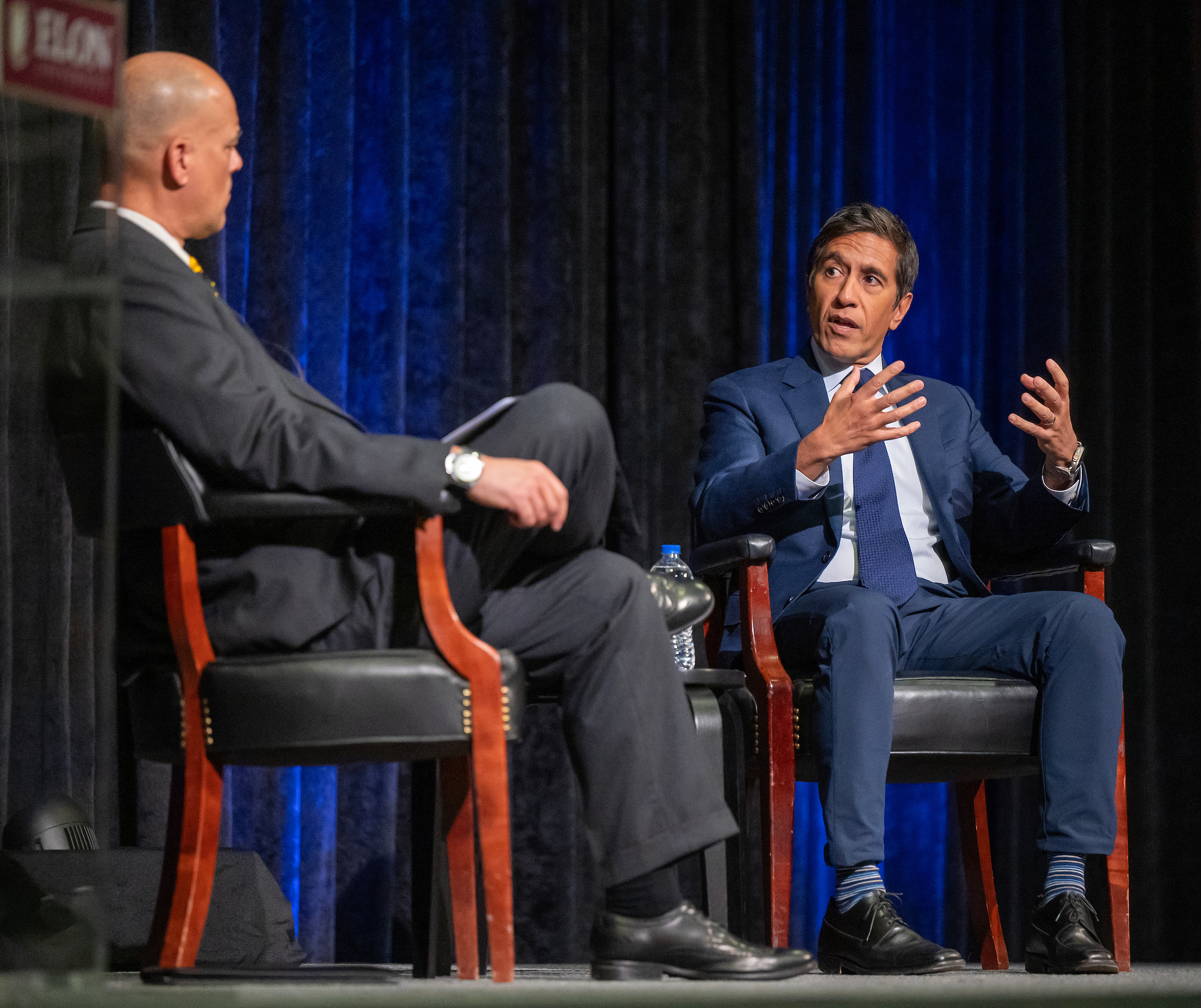
It was obvious to the hundreds in attendance for the annual Baird Lecture at Elon University that Dr. Sanjay Gupta — a practicing neurosurgeon, Emmy Award-winning journalist and best-selling author — wears many hats and is often required to switch them at a moment’s notice.
“There wasn’t a lot of precedent for this sort of thing. I didn’t have anybody I could call and say, ‘How did you straddle these two worlds?’ But, in my case, it’s who I am,” Gupta said.
Despite his successful venture in the world of journalism, Gupta said medicine is his “first and truest love.”
Perhaps no situation is more exemplary of Gupta’s dedication to medicine and ability to switch roles than an account during his time in Iraq as a correspondent for CNN in 2003. He was embedded with a group of Navy doctors who support the First Marine Expeditionary Force when a Marine lieutenant was shot in the head by a sniper. Gupta recalled the other soldiers asking, “Will you take off your journalist cap and put on a surgeon’s cap and take care of this guy?”
Without a second thought, Gupta began to operate on the lieutenant, Jesus Vindaña, in a dusty desert tent with gunfire still sounding off in the distance. With the threat of weapons of mass destruction still imminent, everyone was donned in full protective gear and the tent lacked the necessary tools for such an operation — which involved decompressing the soldier’s head because of significant swelling.
Gupta used a Black and Decker drill to remove part of his skull and an IV bag to recreate the outer layer of his brain. Soon, a Black Hawk helicopter took the soldier away. Several months later, Gupta received a call from the soldier saying he’d like to meet. He sat with the Vindaña and his family and for the first time, they discussed this traumatic experience.
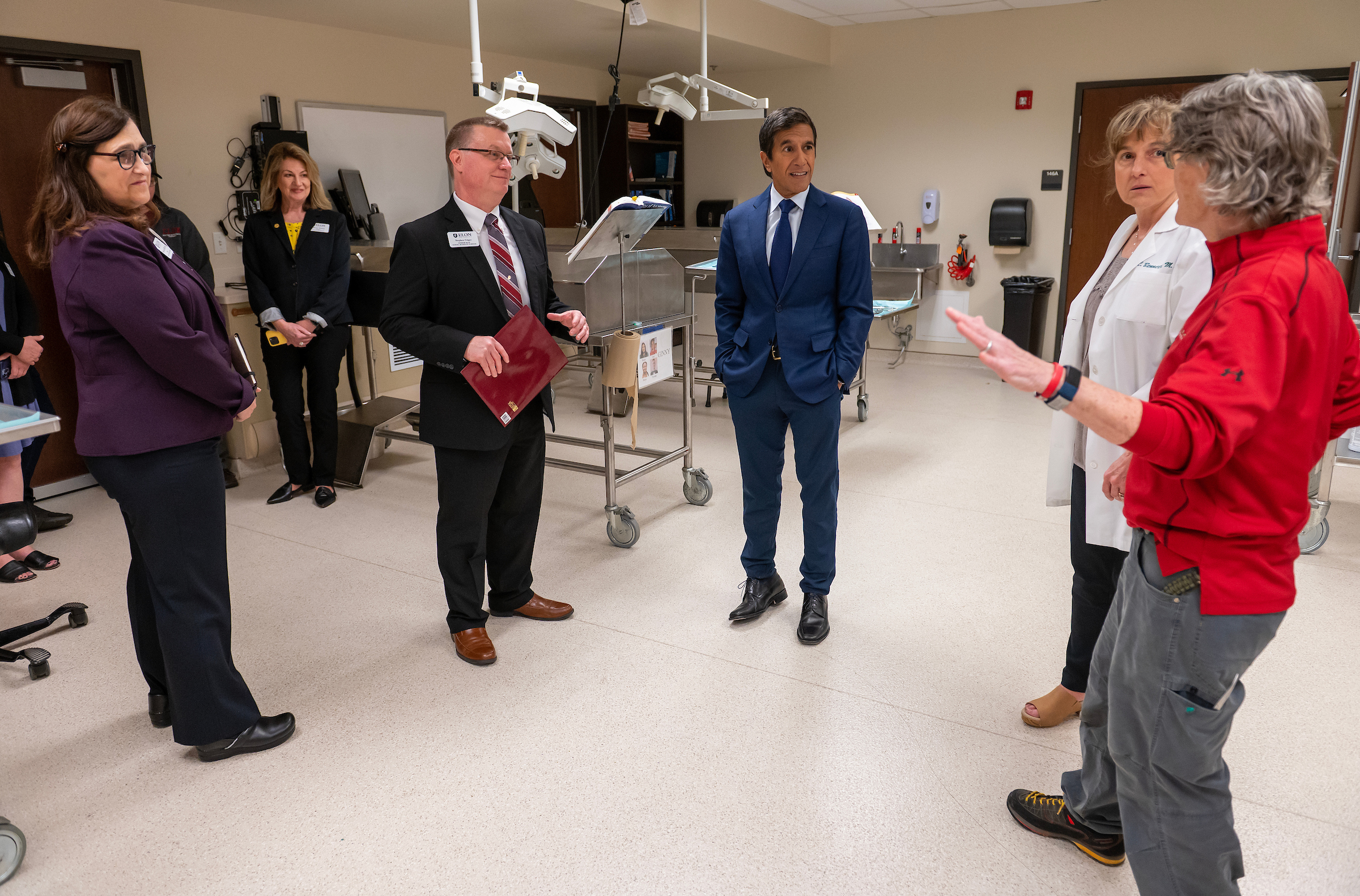
“In that moment, I was suddenly giving a different kind of medicine. I was enabling, empowering, creating a conversation that otherwise would not be had and I think it was really good for all of us to have a conversation like that,” Gupta said to those in the audience at Alumni Gym on Tuesday, March 28.
“And by the way, I think that’s something AI could’ve never done,” he added.
Artificial intelligence was one of many areas addressed during the discussion, moderated by Interim Dean of the School of Communications and A.J. Fletcher Endowed Professor of Strategic Communications Kenn Gaither. With his unique perspective as a neurosurgeon and journalist, Gupta called the issue of AI “the topic of our time.”
“In some ways, we’ve been teetering on this edge for quite some time,” he said. “As human beings, we made machines to do things we no longer wanted to do. And if you just use that as a metaphor … AI, in some ways, is another machine that will ultimately do things we don’t want to do.”
That line of thought raises two questions, Gupta said: What are humans going to do and what uniquely makes us human? “It’s a longer discussion than we have time for right now. But I think, even during the pandemic, we got some sense of those things that made us uniquely human.”
Along with his other duties, Gupta also hosts a podcast, “Chasing Life,” with the most recent season diving into the science of how technology impacts our brains. With three teenage daughters, this topic is especially important to Gupta.
He compared his childhood, which saw the tail end of the Vietnam War, no significant recessions and less worry about climate change, to that of his daughters and their generation, which were born into two wars, lived through three major recessions and climate change being an unavoidable phenomenon. Gupta said he understands why the current generation of younger Americans have increased struggles with mental health.
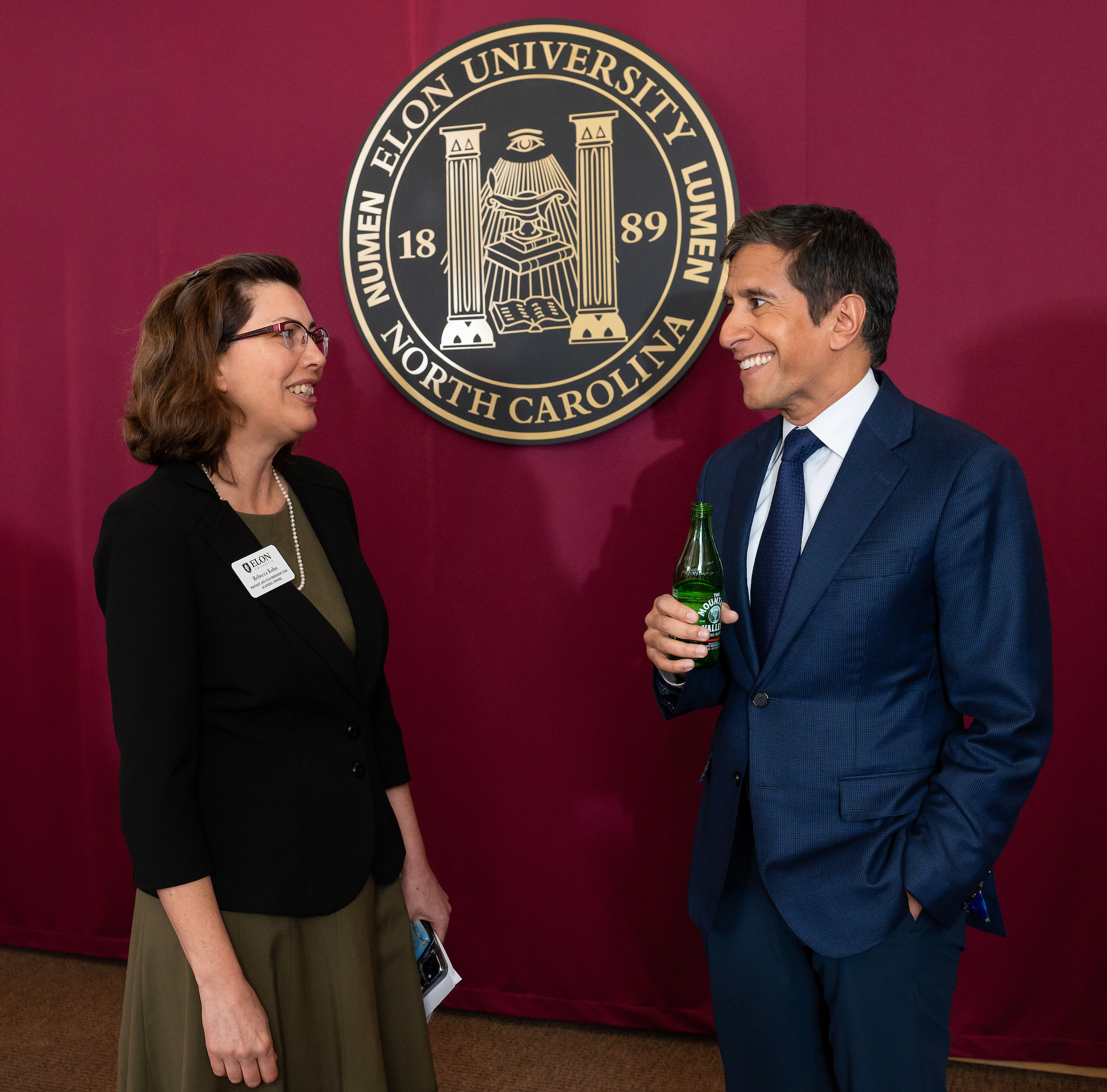
Social media has played a major role in this shift. Gupta invited his daughters, who have consciously avoided the public eye, to his podcast and got their expert opinion on the role social media has on mental health.
During those conversations, Gupta realized that while social media and certain algorithms can lead people down a disturbing path, there is also a lot of affirming that can happen as well. “One of the big points was that as much as we talk about the impact of social media or devices on the brain or mental health, there’s a lot we don’t know,” he said.
The title of the Baird Lecture conversation comes from Gupta’s 2021 book, “Keep Sharp: Build a Better Brain at Any Age.” When starting the book, he set out to focus on how not as much headway has been made in Alzheimer’s disease research as with ailments such as heart disease, lung disease and various cancers.
In two years of research, however, Gupta developed a “sense of hope.” One reason for that hope is due to the evidence that humans can grow brain cells, a process called neurogenesis, at any age. With this breakthrough, neurogenesis soon became the focal point of the book.
He approached leading researchers on this topic and asked them how they began living their lives differently with this new information and what they are doing to harness this neurogenesis. The biggest changes were activity and nutrition. However, the methods to maintain a sharper mind were counterintuitive.
While intense exercise is good to prevent cardiovascular disease, a more moderate activity such as brisk walking is better for the brain, as large spikes of cortisol after intense exercise increases stress. As far as nutrition concerning the brain, researchers found that as soon as blood glucose levels get too high, the receptors in the brain shut off and you could be “overstuffing your body and starving your brain at the same time.”
“Movement and nutrition, they’re the most basic things when it comes to health. But you have to think about these things differently when it comes to the brain,” Gupta said.
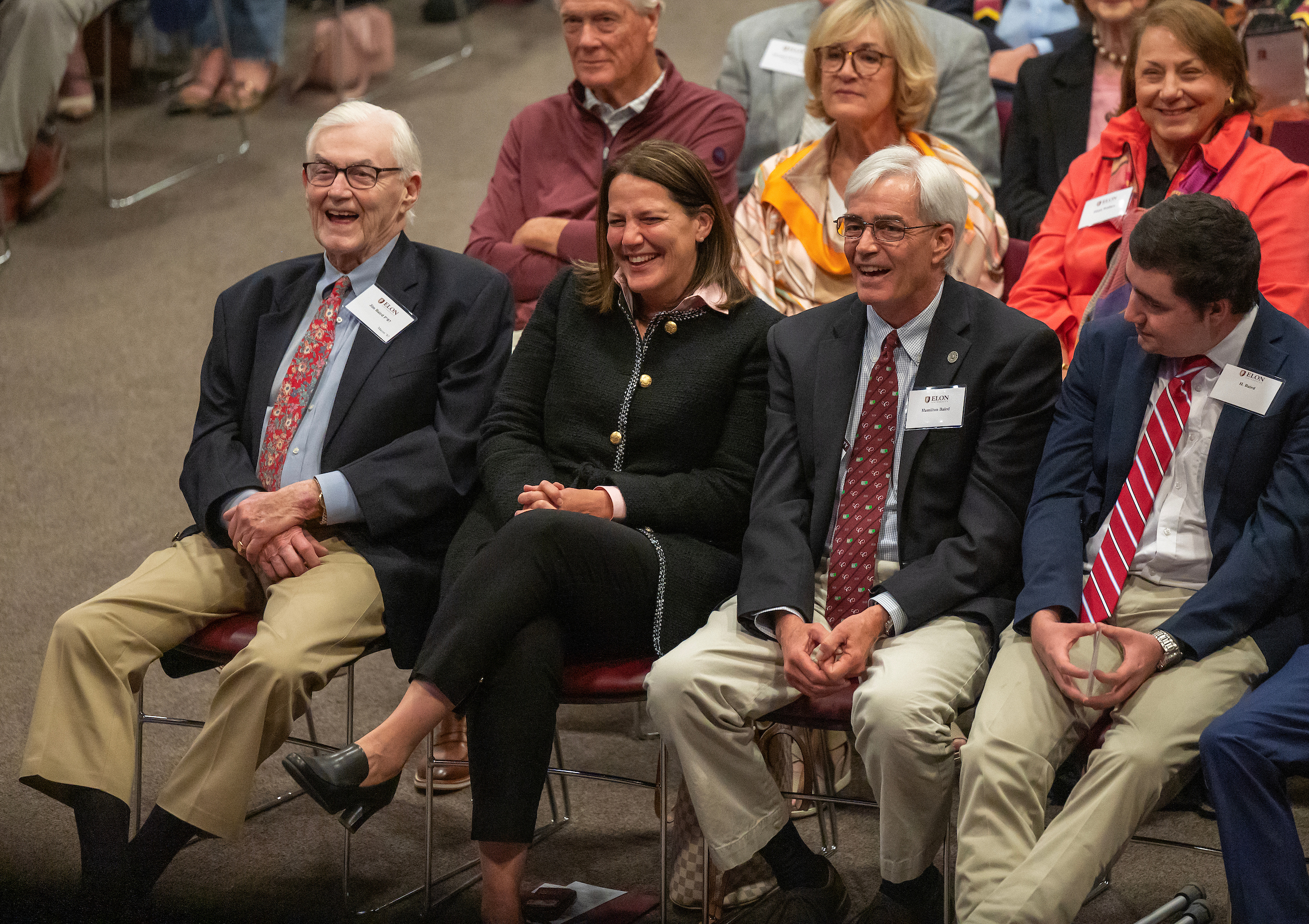
The Baird Lecture Series was endowed in 2002 by a generous gift from James H. Baird and his late wife, Jane M. Baird of Burlington, North Carolina. The Bairds were the first presidents of the Elon Parents Council and their involvement with the university has spanned more than 35 years.
The Elon University Speaker Series welcomes distinguished thought leaders and change-makers who are actively taking on society’s most pressing issues. This year’s Speaker Series, presented by WUNC North Carolina Public Radio, thematically explores “Living Well in a Changing World.”



